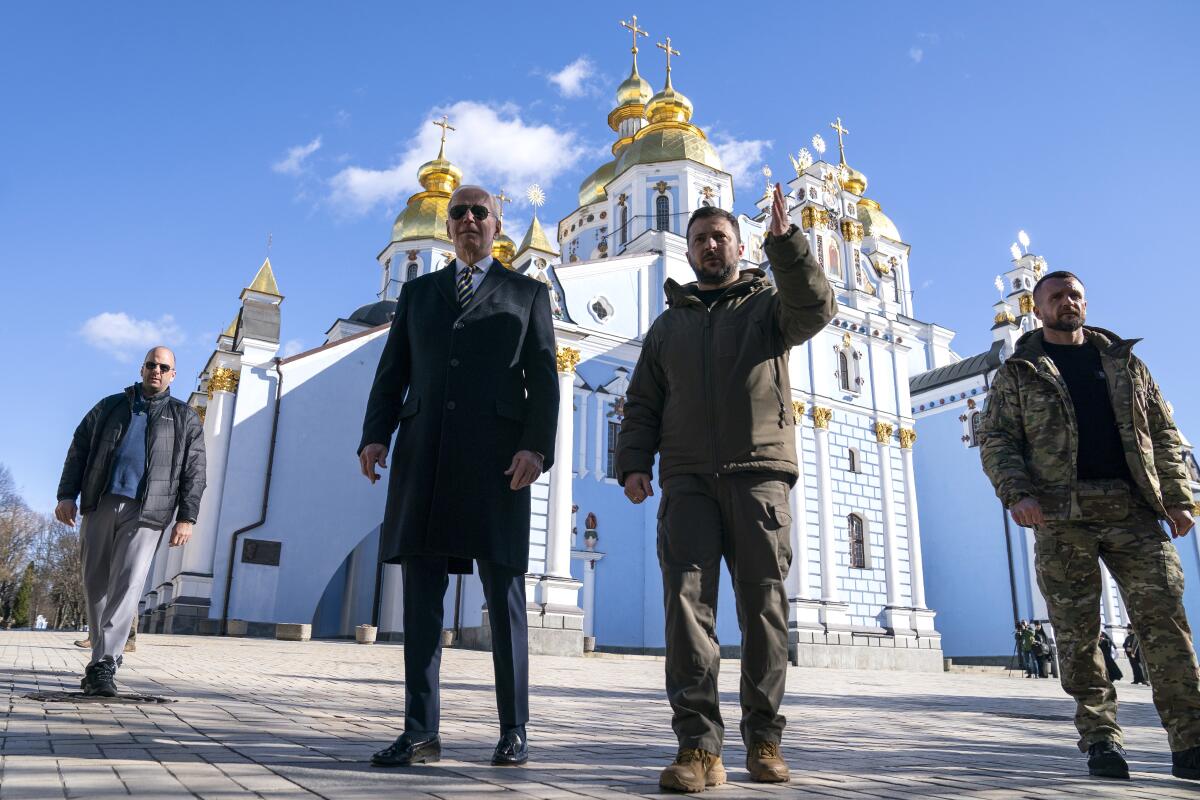Opinion: Biden’s visit to Ukraine should put Putin on notice

- Share via
For almost a year now, my former homeland has been under a brutal attack. But even as Russia keeps hammering at Ukraine, hope has sprung up too. Hundreds of thousands of Ukrainians, and tens of thousands of foreigners, have come forward to defend the nation. More than 50 countries are supporting the effort, with weapons that have allowed Ukraine to reclaim large swathes of territory. And now, President Biden’s surprise 10-hour dash by train from Poland to Kyiv on Monday and his tough speech in Warsaw on Tuesday, in which he proclaimed “Ukraine will never be a victory for Russia — never.”
Biden’s visit to Kyiv gives me hope for three reasons. First, it recognizes the spirited resilience of the Ukrainian people in the face of war. And it gives this resilience a boost.
Ever since the White House announced that Biden would visit Poland, Kyiv had been abuzz with anticipation that the U.S. president might either invite Ukraine’s president, Volodymyr Zelensky, to join him in Warsaw or would visit Kyiv himself. Biden didn’t let them down. He came to Kyiv on Monday — a first in modern times for an American president, entering a war zone that was not controlled by the U.S. military.
This gesture will boost the Ukrainian people’s determination to beat Russia militarily and to build a thriving democracy. Polls by Ukraine’s Academy of Sciences Institute of Sociology last July found that Russia’s invasion had already increased support for democratic values and institutions, compared with respondents’ stances in November 2021.
While in Kyiv, by the “wall of remembrance” dedicated to Ukraine’s fallen defenders, I am sure Biden got a stronger sense of this resilience and a deeper understanding of why Zelensky rejected his offer of safe passage out of Ukraine in the days before Russia’s looming invasion. Biden’s trip sends a loud and clear message to Moscow that he will more strongly support Zelensky’s request made back then: “Give me ammunition, not a ride.”
Second, this bold trip into an unsecured war zone signals the U.S.’ growing strategic audacity, a determination to increase and speed up military support. This is something that Ukrainians feel has been too long in coming — not only because the U.S. took months to approve sending Abrams tanks and Patriot anti-missile systems to Ukraine. To Ukrainians, this war started not on Feb. 24, 2022, when Russia invaded, but on Feb. 20, 2014, when a hundred peaceful Ukrainians were gunned down in Kyiv’s central Maidan Square by a Putin-backed government in an attempt to suppress protests for democratic freedoms and joining the European Union.
This war is a continuation of Russia’s 2014 militarized occupation of the Crimea and parts of Eastern Ukraine. At that time and up to the fall of 2021, the international community discounted the threat of a widespread Russian invasion of Ukraine. The idea of providing Ukraine with heavy artillery, tanks, air defense systems, aircraft and other serious capabilities was deemed too risky, potentially even provoking Russia into a mass invasion. The opposite was true, and the timidity of Ukraine’s allies invited the Russian invasion. Biden’s visit should indicate to Moscow that we now know better.
Finally, Biden’s trip also signals an evolving understanding of the war on the part of the U.S. We now recognize that it won’t be possible to negotiate Russia’s withdrawal from Ukraine with Russian leader Vladimir Putin. It is telling that this visit comes just days after Vice President Kamala Harris declared our government’s recognition that Russia committed crimes against humanity in Ukraine. The evidence of those crimes has been obvious, overwhelming and available for months, indicating this declaration is more likely to reflect a shift in strategy rather than a purely legal assessment.
The rising hope for an end to the war must still be tempered by the harsh reality still playing out in Ukraine. Lives continue to be lost. Cities destroyed. Russia has doubled down, sending in waves of reinforcements. U.S. leaders still seem to entertain illusions that if we sanction a few more Russian banks or oligarchs, the economic effects will decrease the need for military aid. Meanwhile, China and India keep buying more Russian oil, financing Putin’s war. Iran and North Korea send in weapons in exchange for Russian favors that might further destabilize the Middle East and East Asia. And the Kremlin still has grounds to question our resolve, watching how the U.S. and other Ukraine allies agonize over sending Ukraine combat aircraft and longer-range missiles.
And yet, looking back over the past year, in the clash of horror and hope, Biden’s visit weighs in decisively for hope.
Mikhail Alexseev, a professor of international relations at San Diego State University, is the author of “Without Warning: Threat Assessment, Intelligence, and Global Struggle.”
More to Read
A cure for the common opinion
Get thought-provoking perspectives with our weekly newsletter.
You may occasionally receive promotional content from the Los Angeles Times.










